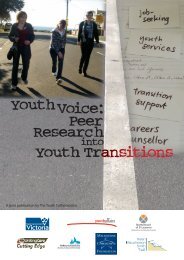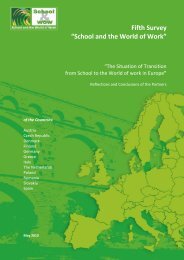Second Survey School and WOW.pdf
Second Survey School and WOW.pdf
Second Survey School and WOW.pdf
You also want an ePaper? Increase the reach of your titles
YUMPU automatically turns print PDFs into web optimized ePapers that Google loves.
WORKING GROUP: SCHOOL<br />
III. Working Group: <strong>School</strong><br />
III.1. General remarks<br />
All young people need access to a range of learning opportunities <strong>and</strong> specialist support if they<br />
are to make a successful transition from school to work, further training or higher education.<br />
Young people <strong>and</strong> their parents or carers have identified the need for expert career advice,<br />
transition support, <strong>and</strong> a range of learning opportunities, in particular greater access to<br />
vocational education <strong>and</strong> training courses <strong>and</strong> opportunities to ‘taste’ a job before they leave<br />
school (“Early Work Experience”)<br />
Young people need skills in communication, planning <strong>and</strong> organising, problem solving,<br />
teamwork, etc. to get work ready, but also need competences <strong>and</strong> competences <strong>and</strong><br />
qualifications to make the successful first step into labour market after school <strong>and</strong> remain in<br />
labour market, at the work place, also concerning to the process of lifelong learning.<br />
Young people should develop these skills while they are at school <strong>and</strong> make their “early work<br />
experience” while they are at school.<br />
Asked questions:<br />
III.2. Questions<br />
III.2.1. What are the competences <strong>and</strong> qualifications young people need to make the<br />
successful first step into labour market after school?<br />
III.2.2. What strategies do exists in your country to assist young people to become ‘work<br />
ready’ <strong>and</strong> develop these above mentioned skills?<br />
III.2.3<br />
How should learning processes are improved to support young people to develop their<br />
own personal competences <strong>and</strong> qualifications needed for a changing world of work<br />
<strong>and</strong> for a successful working <strong>and</strong> personal life?<br />
III.2.4. What are innovative examples <strong>and</strong> good practice for development <strong>and</strong> implementation<br />
of innovative methods <strong>and</strong> measures in school?<br />
III.2.5. What are examples <strong>and</strong> good practice for innovative methods <strong>and</strong> measures in<br />
cooperation of school with the world of work, with companies <strong>and</strong> other institutions?<br />
III.3. Suggestions / Recommendations<br />
What are the consequences for pedagogical processes in school, for teachers, for learning<br />
outcomes? What do you recommend for your country <strong>and</strong> / or in general / in Europe?<br />
9 countries have answered the questionnaire:<br />
Austria, Czech Republic, Denmark, Finl<strong>and</strong>, Germany, Greece, The Netherl<strong>and</strong>s, Pol<strong>and</strong> <strong>and</strong><br />
Slovakia.<br />
‐ 51 ‐




